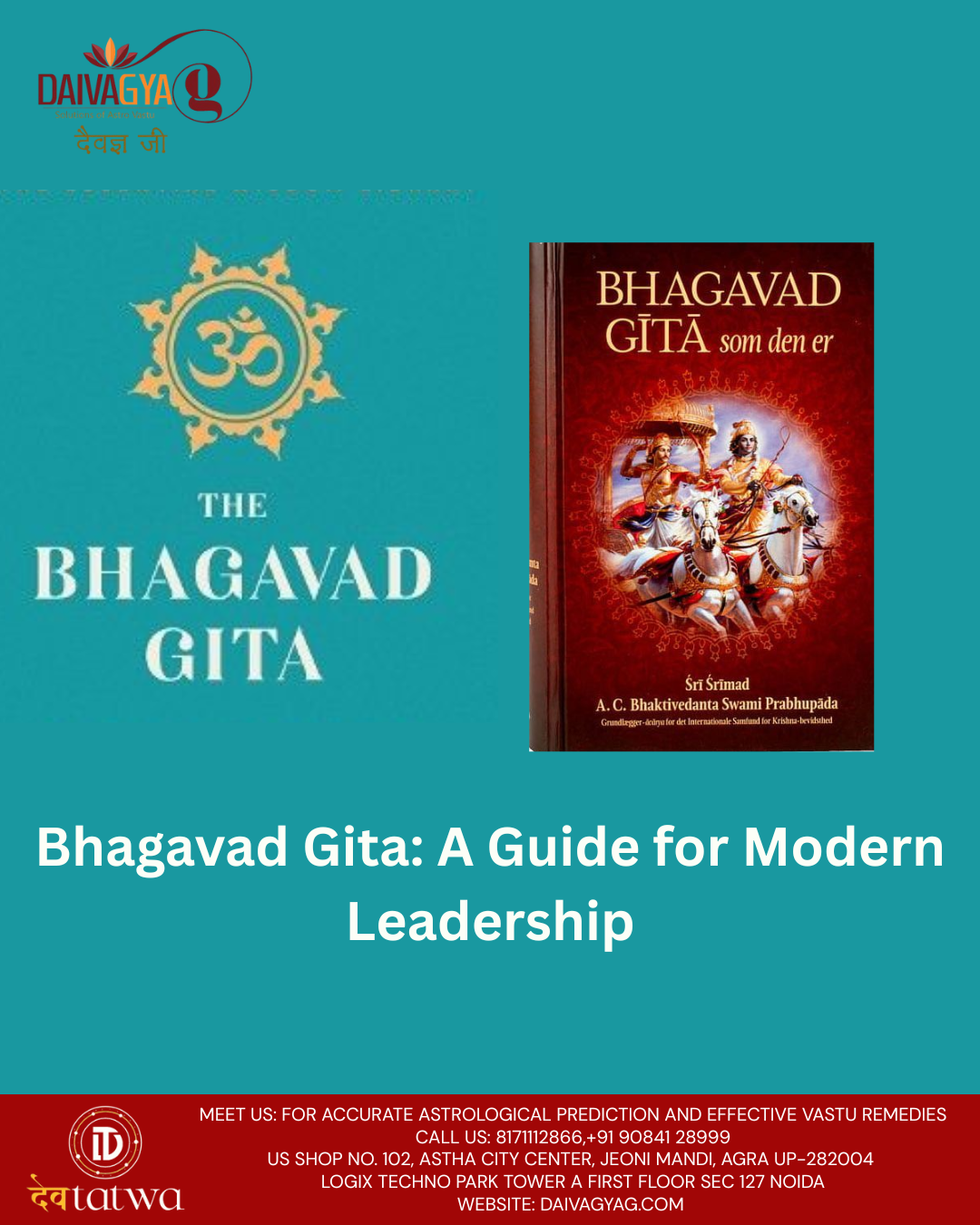Bhagavad Gita: A Guide for Modern Leadership

Bhagavad Gita: A Guide for Modern Leadership
By Dr. Dev Swarup Shastri
Introduction
Leadership has always been about vision, responsibility, and the ability to inspire others. In today’s competitive and rapidly changing world, leaders face challenges such as ethical dilemmas, stress management, decision-making under uncertainty, and balancing material success with emotional well-being. Interestingly, the timeless wisdom of the Bhagavad Gita, composed over 5,000 years ago, provides profound guidance that is more relevant today than ever.
As a spiritual scientist and Vedic expert, I, Dr. Dev Swarup Shastri, have observed that the teachings of the Gita go far beyond religion—they are a universal manual for leadership, management, and life mastery. In this blog, we will explore how the Bhagavad Gita can shape modern leadership in corporate, political, and personal domains.
The Leadership Lessons of the Bhagavad Gita
1. Self-Leadership Before Leading Others
In Chapter 6, Lord Krishna emphasizes the importance of mastering one’s own mind and senses before guiding others. A leader who cannot control anger, fear, or ego will struggle to inspire trust.
-
Modern Application: Emotional intelligence and mindfulness are crucial for CEOs, managers, and political leaders. Self-discipline forms the foundation of leadership.
2. Decision-Making in Times of Crisis
On the battlefield of Kurukshetra, Arjuna faced a moral dilemma: fight his own relatives or abandon duty. Krishna guided him toward clarity and purpose.
-
Modern Application: Leaders today face crises—financial collapses, ethical decisions, or global challenges. The Gita teaches leaders to act with dharma (righteousness), balancing practicality with moral values.
3. Detached Involvement (Nishkama Karma)
Krishna’s most famous teaching is to “perform your duty without attachment to results.”
-
Modern Application: A modern leader must focus on effort, process, and strategy, not just the outcome. By avoiding anxiety about results, leaders can inspire teams to work with sincerity, creativity, and passion.
4. Vision and Purpose (Swadharma)
The Gita encourages every individual to follow their Swadharma (unique duty or purpose). A true leader has clarity of vision and aligns their team with that vision.
-
Modern Application: Great companies thrive when leaders define a clear mission and give employees meaningful goals to work toward.
5. Balance Between Material and Spiritual Growth
The Gita teaches balance between worldly responsibilities and spiritual evolution.
-
Modern Application: Leaders must focus not only on profits but also on employee well-being, ethical values, and social responsibility. This is what makes leadership holistic and sustainable.
Bhagavad Gita in Corporate Leadership
Modern corporate leaders like Steve Jobs, Sundar Pichai, and Satya Nadella have drawn inspiration from Eastern philosophies. The Gita’s lessons on clarity, resilience, and focus help executives:
-
Handle stress in high-pressure environments.
-
Encourage teamwork by instilling shared values.
-
Develop resilience by seeing failures as opportunities for learning.
Bhagavad Gita in Political Leadership
History shows that rulers who governed with wisdom, compassion, and dharma left lasting legacies. The Gita’s principles remind leaders:
-
To serve, not dominate.
-
To balance power with humility.
-
To take decisions for the greater good, not selfish motives.
Bhagavad Gita in Personal Leadership
Leadership does not only mean leading organizations—it also means leading your own life. By practicing Gita’s teachings, individuals can:
-
Overcome self-doubt and fear.
-
Develop confidence and clarity in choices.
-
Inspire family and community through values and ethics.
Benefits of Applying Bhagavad Gita in Leadership
-
✅ Enhances clarity in decision-making
-
✅ Builds resilience in adversity
-
✅ Reduces stress through detachment from outcomes
-
✅ Inspires ethical and responsible leadership
-
✅ Promotes balance between professional success and personal peace
Dr. Dev Swarup Shastri’s Insights
In my practice as a Vastu and astrology expert, I have witnessed how leaders—whether in business or personal life—struggle with balancing material ambition and spiritual peace. The Bhagavad Gita provides the ultimate leadership framework where clarity, courage, and compassion work together.
The Gita reminds us that true leadership is not about authority, but about service, vision, and responsibility toward society.
Conclusion
In today’s digital and AI-driven world, leaders need timeless wisdom more than ever. The Bhagavad Gita provides a roadmap that blends spiritual strength with practical leadership. By embracing its teachings, modern leaders can not only achieve success but also leave behind a legacy of ethics, balance, and inspiration.
With the guidance of ancient wisdom and platforms like DaivagyaG, along with insights from experts such as Dr. Dev Swarup Shastri, the future of leadership will be holistic, compassionate, and truly transformative.


